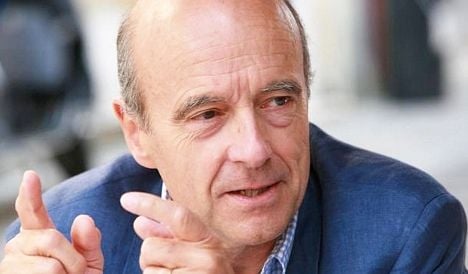“It’s an existential crisis for Europe,” Juppé said, in an interview with the news weekly L’Express that raised the stark prospect of a return to violent conflict on the troubled continent.
“This could call into question all that we have created, not only in the 20 years since the Maastricht Treaty, but since the foundation of the European community,” he warned.
Juppé said the struggles of the 17-nation eurozone’s member states to fund their sovereign debt could bring down the single currency, and that this would be “the explosion of the European Union itself.”
“In that eventuality, everything becomes possible, even the worst. We have flattered ourselves for decades that we have eradicated the danger of conflict inside our continent, but let’s not be too sure,” he said.
Juppé said the threat of a return to violent nationalism made it all the more necessary to protect the euro and the European project, adding “we’ve gone too far to not go further.”
European leaders are to hold a summit on December 8th and 9th to try to find a way out of the crisis, which has seen eurozone member states facing soaring borrowing costs amid fears their debts are unmanageable.
Earlier in the day, the governor of the Bank of France said Europe is facing a “true” financial crisis with global implications. However, he added that confidence in the euro as a single currency remains strong.
“We are now looking at a true financial crisis — that is broad-based disruption in financial markets,” Christian Noyer told a forum in Singapore. “We are facing a financial crisis, not a monetary one.”
Noyer, a member of the European Central Bank governing council, said that while most observers trace the turmoil to “fiscal imbalances in peripheral economies,” they may have been only the trigger.
Noyer insisted that the euro was not under threat.
“Confidence in the currency remains as strong as ever,” he said, adding that exchange rates are high by historical standards and that gross capital inflows into the eurozone remain unaffected by the turmoil.
Noyer acknowledged however that the situation in Europe and the world “has significantly worsened over the past few weeks” and called for a stabilisation of bond markets used by debt-strapped eurozone countries to raise funds.
“Market stress has intensified. Bond markets in the euro area are not functioning normally… It is essential to stabilise European bond markets,” he said.
In other economic news, French domestic demand, the key motor of the country’s consumption-led economy, was stable in October after falling 0.2 percent in September, the state statistics agency INSEE said on Wednesday.
Compared to October last year, demand was down 0.9 percent, reflecting France’s high and rising unemployment rate and President Nicolas Sarkozy’s austerity programme, designed to rein in a massive public deficit.



 Please whitelist us to continue reading.
Please whitelist us to continue reading.
Member comments